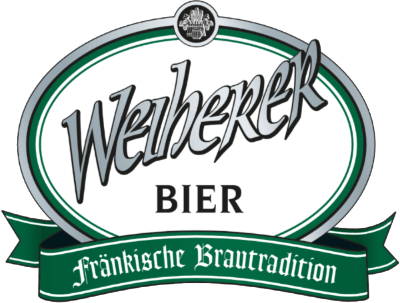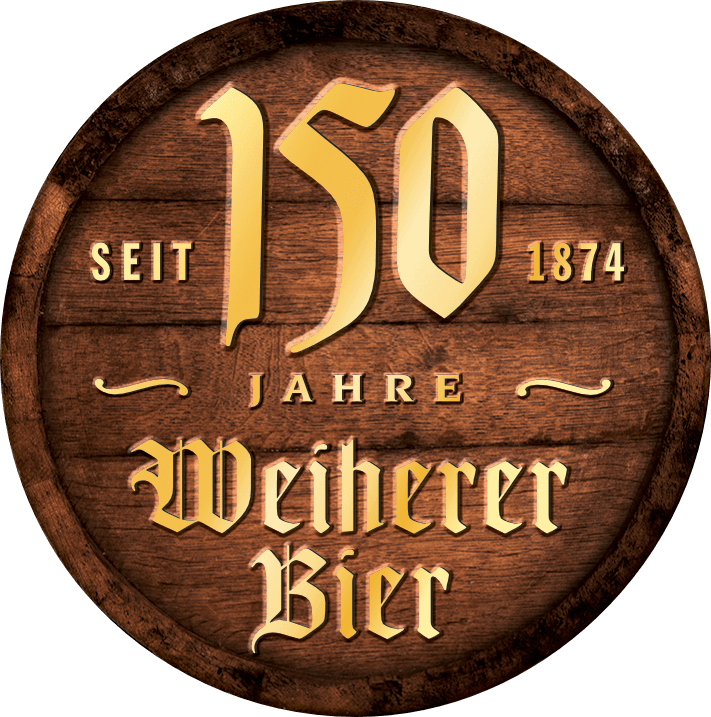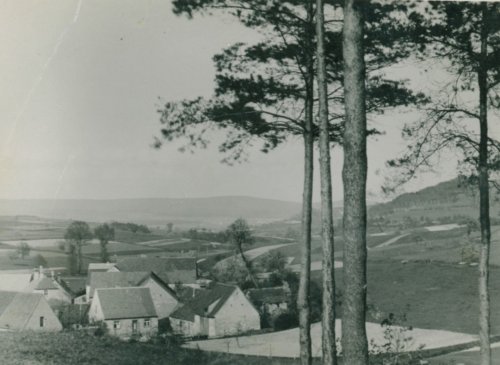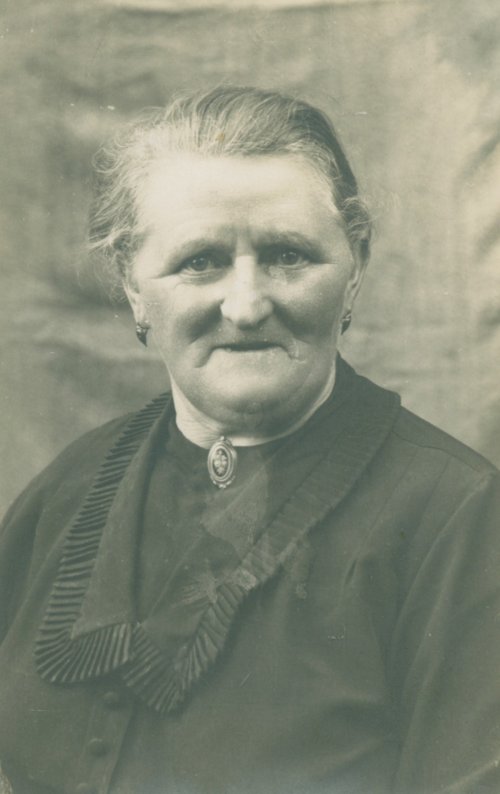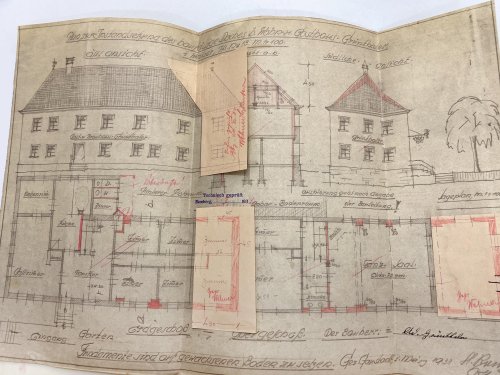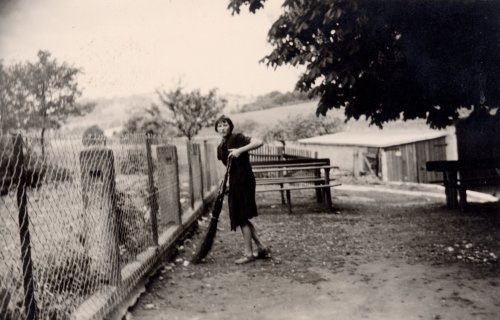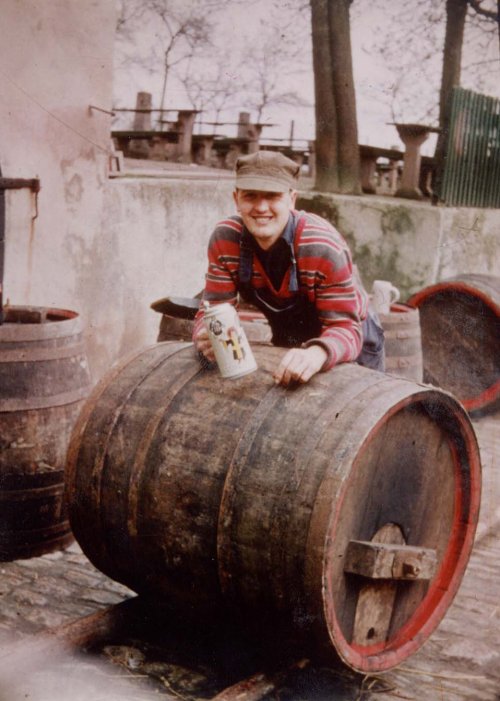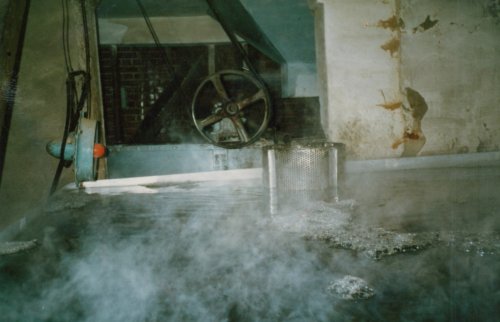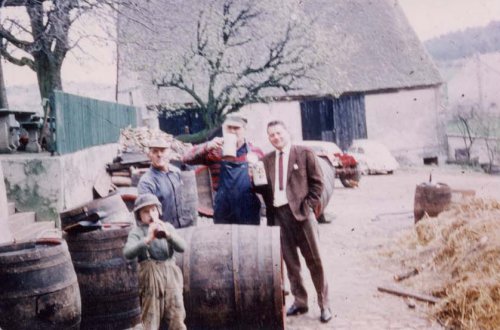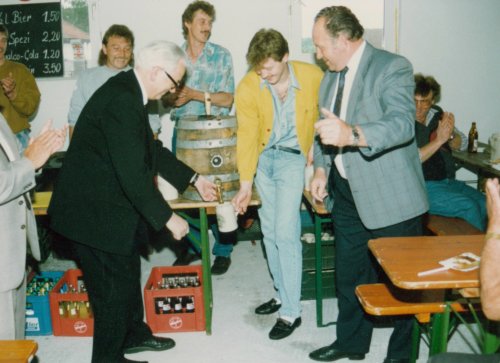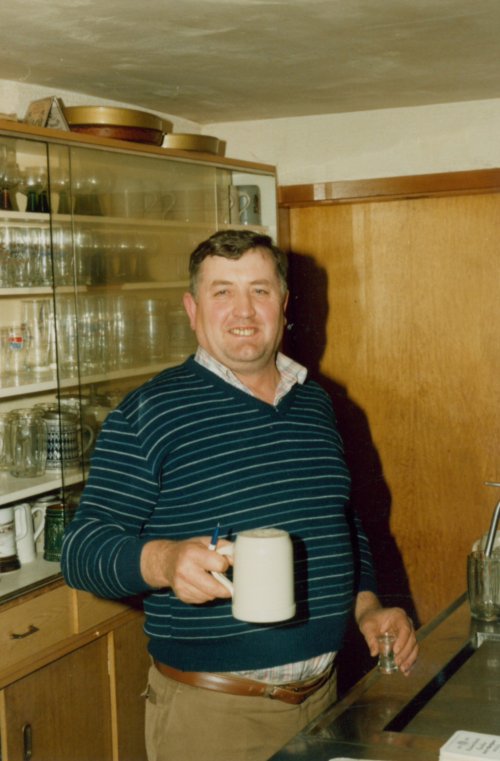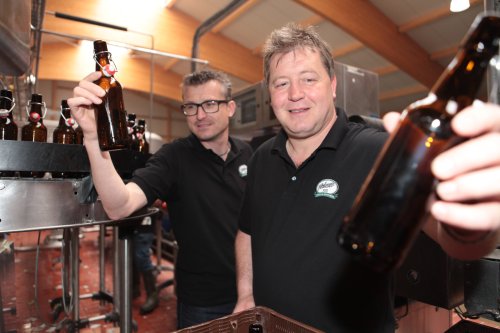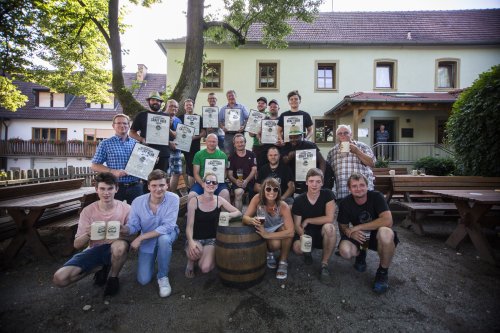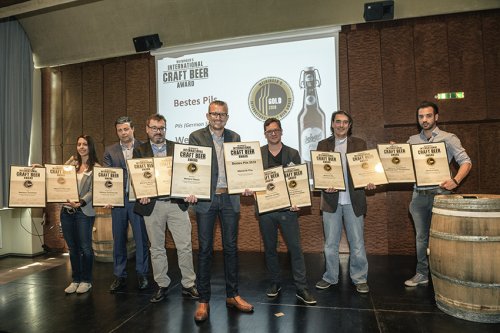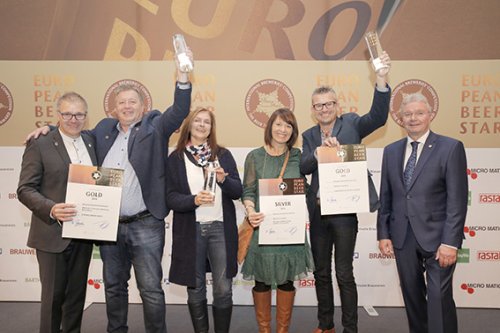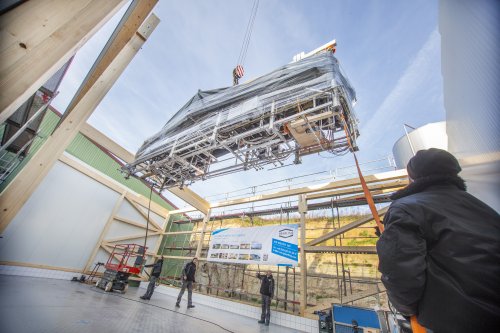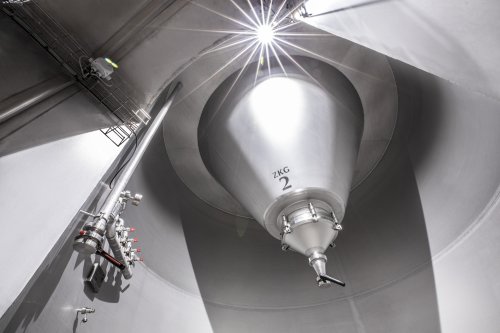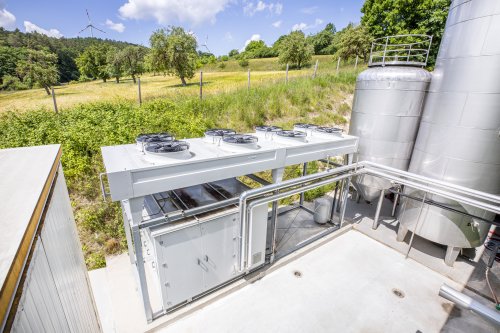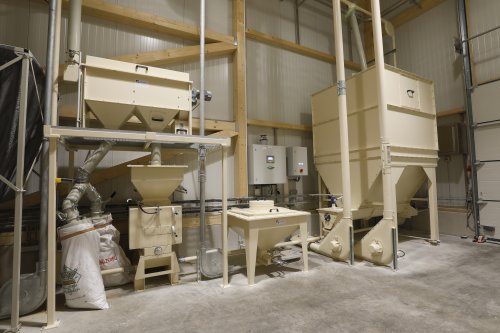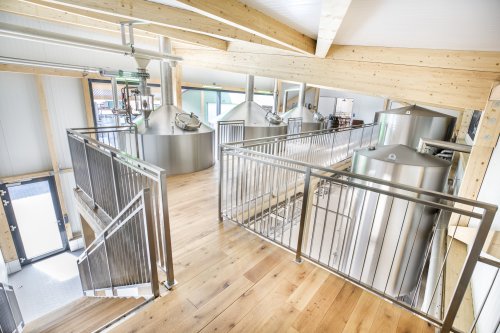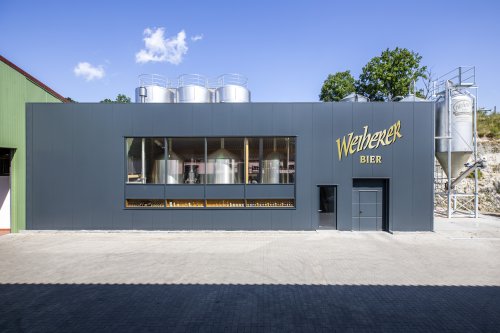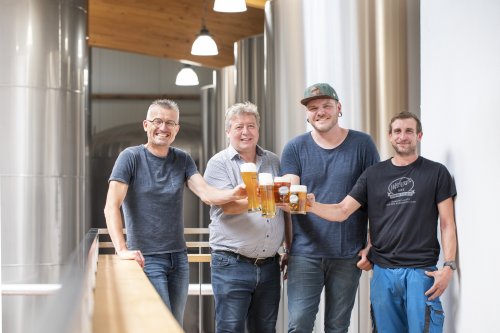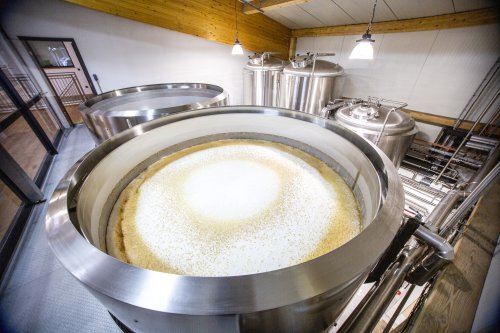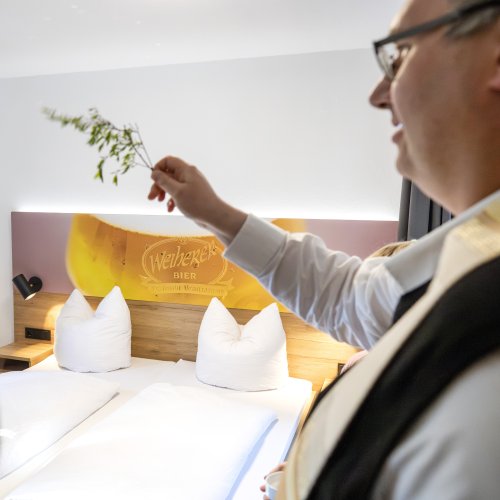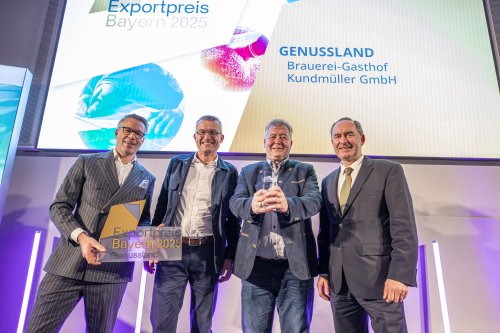1782: Since then, the estate has been family-owned. It is an agricultural estate with a primary focus on farming. Wine is cultivated, and there is likely a small seasonal wine tavern.
1874: The brewery is founded by Michael Bayer. It is built on the site of the old pressing house. During the winter, a single type of beer is brewed.
1902: Michael Bayer passes away. His son, Johann Bayer, takes over the brewery but dies suddenly in 1907, leaving behind his wife Elisabeth and three children.
1907: Johann Bayer dies unexpectedly, and Elisabeth’s second husband, Adam Grünthaler, takes over the brewery. He later registers it as a member of the Brewers' and Maltsters' Guild in Bamberg and, subsequently, with the National Guild Association for Brewing and Malting Craft.
1933: The roof of the main building is repaired, and the existing dance hall is expanded. The corresponding building plan can be seen in the photo gallery.
1960: Michael Grünthaler succeeds Adam Grünthaler for just a few hours. He dies of cardiac arrest at the same night aged 50, leaving behind his wife and three daughters. A community of heirs takes over the brewery, inn and farm. The deceased owner’s wife Maria looks after the inn and the three daughters Gunda, Mathilde and Anna, while the beer is brewed by Michael Grünthaler’s step-brother Michael Bayer and the citizens of the Weiher community.
Anna and Erwin
1964:
The youngest daughter Anna marries the farmer Erwin Kundmüller. From 1969, they jointly run the brewery inn - with great commitment and passion they work round the clock. Anna is mainly involved in the farm work, while Erwin works in the fields and also brews beer during the winter. This is due to the fact that there is still no refrigeration.
He makes around 350 hectoliters of beer per year (1 HL = 100 liters). The amber-colored, unfiltered beer is stored in big 600 liter “mother” barrels. The stall and barn are located were today the annex with the adjoining room and distillery can be found. And not far away: An old cave serving as one of the storing places. The beer is still carried in vats from the brewhouse to the “mother” barrels. Since the barrels are made of wood, a cooper is called once or twice the year. The barrels are then manually sealed, traditionally by burning a piece of pitch inside, which would not be possible today.
Fermentation takes place in open vessels, which is the traditional method of many breweries at the time. This means that the beer is pumped to a wort chiller and then to a tub where the yeast is added. The beer remains in the tub for one week before the conditioning starts. It is only in 1990 that open fermentation is gradually replaced by fermentation tanks. The old fermentation cask used until 1969 - as well as the former lauter tun - can still be viewed as historic remnants in the inn.
Time for Bockbier...
1989: Roland Kundmüller joins the family-owned business. While “Weiherer Lager” was the only beer brewed and tapped during his apprenticeship, Roland Kundmüller introduced the “Weiherer Bock” along with the now traditional ceremony marking the tapping of the first keg of the new season’s bock beer.
1990: A new brewhouse still in use today is built. Numerous modifications and refurbishing measures are conducted over the next few years.
1997: Beer is filled in bottles for the first time, and one year later also in swing-top bottles. Weiher’s first top-fermented beer, Weiherer Weisse, is brewed and soon followed by Weiherer Pils.
In the new millennium, or rather in 2005, a major new project begins: to boost capacity, a new warehouse and logistics center is built next to the brewery.
The Kundmüller Brewery receives its first awards a little later, starting with the “Bierkeller” (beer garden) of the Year Award and the European Beer Star Silver Award for Weiherer Rauch. The following years see Kundmüller Brewery take another 12 awards in total, including the Consumer’s Favorite Award on two occasions.
Our homeland
2007: Another big step in the history of Weiher: Roland and Oswald Kundmüller join the management board and shape the development of the family business from now on.
Because the family cares about its homeland and the protection of the environment, the Kundmüller Brewery obtains certification as an organic brewery in 2011. This is followed by the introduction of Weiherer Urstöffla and Weiherer Keller-Pils, both still part of the range today. AND: Long before the craft beer trend takes off, Roland and Oswald Kundmüller create their first extraordinary beer specialty in a champagne bottle, Weiherer Bock Bourbon Style.
In 2012, a new filling center is built and the storage cellar extended. Roland Kundmüller has now his own beers in his own hands from the first to the final steps. In the same year, Kundmüller Brewery receives the “Solarbier®” brewery accreditation for being a solar-powered brewery. From now on, part of the product range is brewed using renewable energy only.
And development continues: 2 further beers are added in 2013, Weiherer Landbier and Weiherer India Pale Ale, a special limited edition brew which is included in the regular product range two years later.
2014 is a year full of celebrations. To mark its 140th anniversary, Kundmüller Brewery launches the Weiherer Special Brews range, featuring the Weizenbock and Weiherer Festbier 1874. They also win the World Beer Cup Silver Award for Weiherer Rauch and Monde Selection Gold Awards for Weiherer Keller, Weiherer Urstöffla and Weiherer Weisse. In the same year, renovation of the inn starts and continues through to its completion as a modern, yet traditional country inn and brewery in 2016.
In 2015, the first collaborative brew "36 Kreisla" is introduced—the world's first county beer. The project was initiated by Johann Kalb, the District Administrator of Bamberg County. The idea and its realization as a collaborative brew came from the Kundmüller Brewery. In 2021, the county beer was honored with the Golden Beer Idea award.
2017 is another year full of developments and innovations. On the one hand, in addition to Bio-Zwickerla Dunkel, Weiherer Summer Ale and Weiherer Schwärzla, new - partly seasonal - beer specialties are introduced and for the first time two beers are brewed together with the Fat Head's Brewery from Ohio / USA, the Imperial Ipa and the Hopferla. On the other hand, the Weiherer Biermuseum (beer museum) is launched, which will be officially presented at the big brewery festival in summer 2018.
Another highlight: in 2018, with 14 awards, including "Best Pils" in the competition, the Kundmüller brewery was not only the most successful participant in the International Craft Beer Award. At the end of the year, the brewery won two gold and one silver medals at the European Beer Star and got therefore awarded "Best German Private Brewery" - a very special honor for the owners Roland and Oswald Kundmüller.
New Brewery for Weiherer Beer
2019: Another "award-winning" year! Nearly 20 medals at the International Craft Beer Award and European Beer Star speak for themselves. The brewery's management makes a significant decision: a new brewery is to be built. Planning begins and extends into the following year. A major project for Kundmüller Brewery is underway.
2020: A year of challenges and resilience. The COVID-19 pandemic impacts planning, daily life, and brewery operations. However, the brewery demonstrates ingenuity by launching a large-scale campaign against beer waste. The team remains positive and is rewarded: Kundmüller Brewery wins "Craft Brewery of the Year" at the International Craft Beer Award and "Brewery of the Year" at the Bierothek online beer retailer awards. Additionally, the collaborative brew "Weiherer/Cervejaria Bamberg Rauchbock" wins bronze at the European Beer Star.
New to the range this year are Weiherer Hopfenweizen, Weiherer Kräusen Hell, and Weiherer OSw-Alt. The highlight of the year is the completion of a new, innovative, and energy-efficient brewery featuring a malt mill, a 60 hl 5-vessel brewhouse, a new yeast, fermentation, and storage cellar with two open fermentation tanks, a centralized cooling system, lab facilities, staff rooms, and a visitor platform. This €3 million investment is the pride of the Kundmüller brothers. From summer 2020 onward, all beers are brewed on the new system.
2021: A year of highs and lows. Despite ongoing COVID-19 challenges, there are many successes: 31 awards at the Meininger's Craft Beer Award, World Beer Award, and European Beer Star, including "Kellerbier of the Year," "Imperial IPA of the Year," "Session Ale of the Year," "Best German Pils," and "Best German Bock." The county beer "36 Kreisla" is awarded the Golden Beer Idea 2021, a source of great pride for the owners.
The pandemic causes operational difficulties, requiring short-time work and the closure of the tavern, beer garden, and guesthouse for over six months. Gradual reopening occurs in the summer under strict hygiene regulations. Investments include a new palletizing robot and a case inspection system.
New products include "Weiherer Zwickerla Alkoholfrei" and "Weiherer Weizen Alkoholfrei" alongside "Weiherer Mix Cola Orange." Senior manager Anni celebrates her 75th birthday.
2022: The awards continue with 12 medals at Meininger's Craft Beer Award, including "Doppelbock of the Year 2022" for Weiherer Rolator. Weiherer Rauch wins a silver medal at the prestigious World Beer Cup—the brewery's most significant achievement to date. Additional honors include nine medals at the World Beer Award and three European Beer Stars, including the inaugural Future Award for exemplary sustainable operations.
The Ukraine war prompts a solidarity brew based on a Ukrainian recipe to support the people and brewers in Ukraine. The range expands to include "Weiherer Mix Zitronenlimo." Two anniversary beers—a Smoked Baltic Porter and a Pils—are brewed with Mariental Brewery in Poland to celebrate 15 years of partnership.
In July, the new brewhouse is inaugurated during a two-day brewery festival, delayed multiple times due to the pandemic. Investments include a new empty bottle inspection machine. Senior manager Erwin celebrates his 80th birthday.
2023: The title of "Best German Pils" at the World Beer Awards is the standout recognition of the year. In total, the brewery wins 17 medals at the World Beer Awards, 12 at Finest Beer Selection, and silver and bronze at the European Beer Star for Weiherer Bock, Rauch, and Landbier.
New additions include the "Weiherer/Fat Head's Grischbeerla" Session IPA—a collaboration with Ohio's Fat Head's Brewery—and "Weiherer Mix Orangenlimo" and "Weiherer Radler Hell." Investments include a new storage hall for bottle sorting and an expanded photovoltaic system with an additional 124.2 kWp.
2024: The year marks the 150th anniversary of Weiherer Beer. A series of beer-centric events are planned, starting with the transition of Weiherer Pils from swing-top to Euro bottles in January.
Major investments include a "Craftmate" bottle filler for gentle, high-quality, energy-efficient bottling. By February 1, the gastro kitchen modernization is complete. In February, Oswald Kundmüller visits collaboration partner Matt Cole of Fat Head's Brewery in Cleveland, Ohio, to brew "Weiherer Lager" using an old Weiherer recipe.
On April 24, three Weiherer beers win at the World Beer Cup in Las Vegas, with gold for Weiherer Kräusen Hell and silver for Weiherer Rauch and Weizenbock. Kundmüller Brewery becomes the most successful European brewery at the event.
The 150th-anniversary celebration takes place from June 14 to 16, with visitors from near and far raising glasses of Weiherer Festbier. In August, the brewery wins 24 medals at the World Beer Awards, including "Best Imperial Stout" and "Best Stout and Porter" for Weiherer/Cervejaria Bamberg Zapfenduster.
In September, Anni and Erwin Kundmüller celebrate their diamond wedding anniversary (60 years). In November, former apprentice Johannes Hartmann becomes German Brewer and Maltster Champion.
At the European Beer Star on November 27, Weiherer beers win four medals, including silver for Summer Ale and bronze for Weizen, Rauchbock, and Lager Hell. In its jubilee year, the brewery earns 31 awards for 23 beers.
2025: The guesthouse and historic building rooms were renovated. The rooms now shine in new splendour, featuring individual design and Franconian coziness with a “beery” touch. Each room is named after a Weiherer beer style, and the interior design lovingly reflects the respective beer. In April, the official opening and an open house event took place.
In May, Weiherer Rauch won Gold at the World Beer Cup, the oldest and largest beer competition in the world, making it a world champion. The Kundmüller Brewery was named the most successful German brewery. In June, the brewery received the title “Brewery of the Year 2025” at the Finest Beer Selection, a renowned beer award by Doemens and Meininger Verlag. In July, the brewery was presented with the Future Award of the Chamber of Crafts for Upper Franconia in the category “Energy-Efficient & Sustainable Craftsmanship.” Also in July, twelve awards followed at the World Beer Awards, including two national winners, and in August, the Weiherer / Cervejaria Bamberg Zapfenduster was crowned world champion for the second year in a row during the global World Beer Awards. At the European Beer Star, Weiherer Rolator won the silver medal.
In November, there was again reason to celebrate – twice in fact: the Climate and Energy Agency Bamberg presented the Kundmüller Brewery with the Climate Protection Award 2025 on behalf of the City and District of Bamberg for the project “Sustainability Transformation of a Traditional Family Brewery.” The award honours projects, initiatives, actions or technologies that have made outstanding contributions to protecting the natural environment and promoting sustainable economic practices. And also in November, the brewery was delighted to receive a truly surprising recognition: Bavaria’s Minister of Economic Affairs, Hubert Aiwanger, presented the Export Award Bavaria 2025. This prestigious business award honours small and medium-sized companies from Bavaria that have successfully positioned themselves on international markets with innovative concepts, clear strategies and strong commitment.
